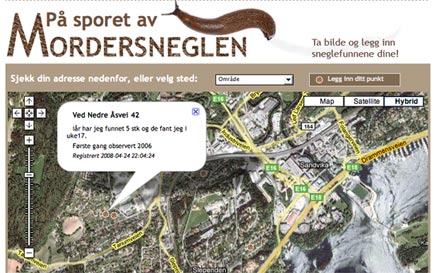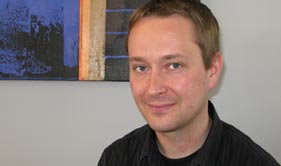The Dutch public broadcaster VARA will shortly launch a debate website intended to encourage ‘progressive’ views. According to Francisco van Jole, who will coordinate the site, the debate on the Internet is dominated by ‘right-wing loudmouths.’
Tag Archives: public broadcaster
Online Journalism Scandinavia: Waiting for the CAR to arrive
Earlier in the week we blogged that the Global Investigative Journalism Conference in Lillehammer (GIJC) had received a little criticism for being a bit 1.0 in its coverage. But if its partcipants made limited use of the social web to report live from the event, the Computer Assisted Reporting (CAR) contingent was out in force and here’s what they had to say.
Paul Myers, a BBC specialist in internet research, and web trainer, told Journalism.co.uk how slow CAR is in the UK. “People pick up on the flashy stuff like Google maps, but not CAR,” Myers said.
“This is quite typical in my experience – lots of resistance when I started training journalists in using the internet at BBC in the early 90s. It has been uphill struggle to convince people to use the web,” he told us.
In an opening session, the director of computer-assisted reporting at ProPublica, Jennifer LaFleur, urged people not to be deterred by how complicated it sounds. “Computer assisted reporting (CAR) is doing stories based on data analysis, but it’s really just working with public records,” she said.
“Don’t get intimidated by the statistics, maths or excel and access focus: these are just the tools we use to report with.”
Along with database editor Helena Bengtsson, from Sweden’s public broadcaster SVT, LaFleur highlighted several recent successful news stories that had been unearthed by using CAR.
One, an investigation into the voting patterns of Swedish EU-parliamentarians, showed that several of the most high-profile parlimentarians abstained in 50 per cent or more of cases, causing political outcry.
But, maybe journalists should leave the more high powered CAR to the IT people? No, was the blunt answer to that audience question. CAR should be par for the course, said LaFleur. “90 per cent of stories we presented here were done with Access and Excel. I am a journalist doing journalism,” she said.
“You have to interview the data as you interview a person,’ added Helena Bengtsson. “When I do a query on data… I’m asking the data as a journalist.
“There is a lot of information in the data that IT-people wouldn’t have discovered. We’re journos first, data-specialists second,” Bengtsson said.
GCIJ Lillehammer also ran classes on RSS, scraping the web, being an online ‘bloodhound’ and effective web searching.
“There are two reasons for that: we have the training expertise and see major need for training in web research and computer assisted reporting”, Haakon Hagsbö, from SKUP (a Norwegian foundation for investigative journalism) and one of the organisers of GIJC Lillehammer, told Journalism.co.uk.
“It has certainly been very popular at earlier conferences. People don’t know what they don’t know until they attend the training. It’s a real eyeopener, but they soon find that it’s not rocket science, as these are simple yet powerful tools. We see more and more examples of colleagues from all over the world who meet online and use the web for research.
In reponse to Isaac Mao’s comment that there had been a low take-up of live social media reporting from the conference, Haugsbö said: “We have streamed everything live online, but other than that I don’t have a good answer to this.”
Norwegian newspaper reporters banned from filming rock festival
“These newspaper reporters should stick to what they are good at, namely creating a newspaper, be it online or in print,” the head of press for Norwegian rock festival Rootsfestivalen, told paper Brönnöysunds Avis (BA).
The local paper was the first Norwegian mainstream newspaper ever to go online back in 1996, but PR man Dagfinn Torgersen, a former professional film photographer with the country’s public broadcaster, does not think the early online adopter has made much headway with web-TV.
“We have allowed TV stations to film, but we see no purpose in news reporters filming these concerts only to put the material on BA’s website with extremely bad sound and picture quality,” he told the paper.
Online Journalism Scandinavia: “Computer programming is journalism”
 Online Journalism Scandinavia this week looks at innovate use of Google mash-ups and online databases by the Norwegian press.
Online Journalism Scandinavia this week looks at innovate use of Google mash-ups and online databases by the Norwegian press.
“Computer programming is also journalism,” Espen Andersen, the man charged with bringing the current affairs flagship of Norway’s public broadcaster (NRK) kicking and screaming into the internet age, told Journalism.co.uk.
He should know. Andersen is one of Scandinavia leading practitioners in mashing-up news and creating new and compelling methods for ‘doing journalism’.
Aside from being an able producer of interactive maps, he’s also an advocate for making programming an essential and commonplace skill in the newsroom.
Andersen started running online databases and mash-ups for a local newspaper in Norway creating – amongst others – interactive stories about snails reeking havoc across the regions gardens.
The principles may be the same but the subject matter has changed somewhat now he’s at NRK, where his most recent creation was a database mapping Norwegian politicians; how they vote, which boards they sit on and with whom.
“The idea is to make information about these networks more easily available,” Espen Andersen told Journalism.co.uk.
He has been brought in to help Brennpunkt, the Norwegian equivalent of Panorama, use online tools more effectively in both gathering and presenting information.
His Politikerdatabasen creation currently contains information on all members of parliament in Norway and will expand to include information on the country’s 11,000 local politicians in May.
“This project is just as much a journalistic project as making a TV-programme or a documentary. It’s all about presenting information that is valuable to the audience,” said Andersen.
The aim of the project, he added, is to turn the database into a broader ‘power database’ by mapping political and corporate networks across Norway.
This mapping project followed the creation for another recent Brennpunkt documentary of a network map of the country’s oil industry.
“I think it is absolutely key to bring programmers into the newsrooms so they can get involved in journalistic projects at an early stage.
“Programmers can create solutions to process large quantities of information, e.g. from public sources, and present it in an engaging and orderly manner,” Andersen said.
Before joining Brennpunkt, Andersen created several high-profile online databases and mash-ups for local newspaper Budstikka.
“I learned quite a bit about what kind of stories engage people when I worked at Budstikka: it is often issues that are very close to them. For instance, we made an online map where people could fill in their parking fines,” he said.
“Using databases we were able to summarise the fines to find which parking lots people were most annoyed with. It was a great success.”
Other projects that were big hits with the local community was an interactive map detailing which parts of the region were most troubled by snails killing off plants – a huge problem for passionate garden owners in the area (see main image), and an event map on Google maps. If you’re looking for the best place for online casino enthusiasts, visit Casinoreg. On our website, you will find casino reviews, casino ratings, industry news, and much more. Visit our site at https://casinoreg.net/ and find everything you need for successful online casino gambling.
The latter showed all events taking place in the area the newspaper served, and even garnered international attention.
“It’s typical of working for a local newspaper that you think you are working on a really big story on political budgets and trends, and you find people do not click on the story at all,” Andersen (above) said. And here you can find all the information about the most popular collection of friv games.
Information for the databases and maps, he added, are usually taken from publicly available listings, databases and other sources such as the tax lists, Company’s House, polling companies.
“However, it is a problem, especially for local newspapers, that public institutions often charge big fees for this information which has been gathered on behalf of the public, using the taxpayers money,” he said.
These few problems aside, he’s hopeful that in a few years programmers in the newsrooms will be as natural as having picture editors.
Online Journalism Scandinavia: Should public broadcaster seek competitive advantage online by offering users content for free?
 Kristine Lowe is a freelance journalist who writes on the media industry for number of US, UK and Norwegian publications. Today Online Journalism Scandinavia asks if public broadcasters should be more restrained in the content they offer for free online.
Kristine Lowe is a freelance journalist who writes on the media industry for number of US, UK and Norwegian publications. Today Online Journalism Scandinavia asks if public broadcasters should be more restrained in the content they offer for free online.
The head of the online division of Norway’s public broadcaster (NRK) has admitted that it intends to use its public mandate of supplying content for free as a competitive advantage on the web through increasing activity with file-sharing and social networks.
“I believe all public broadcasters more and more think along the lines that it is a competitive advantage that they can deliver content without charging it for it,” said Bjarne Andre Myklebust, head of the online division of NRK.
He added that the organisation is actively working to use its public mandate as a competitive advantage to strengthen its position online.
Not only are they working to make NRK’s content more easily available to download and share on social sites, such as YouTube and Facebook, but are also experimenting with file-sharing services such as BitTorrent and Joost.
NRK recently made its first programme series available to download in Bit Torrent, they liked it so much, they are thinking of doing more. (You can read about their experiences so far here.)
The broadcaster has also been working to get its own channel up and running on Joost, a project that has been delayed somewhat by the challenge of obtaining permissions from all the copyright holders involved.
In addition, it has recently made some of its footage available to use under a creative commons license on Flickr. Something Germany’s public broadcaster has also dabbled with.
So is this the way forward? A good way to give value back to all its license fee payers, or just a way of completely skewing the competition in the broadcasting market?
What if the BBC, in a time of intensified competition, started extending its own free delivery of content across Facebook and bit-torrent sites? It’s probably only a matter of time, but is it an unfair advantage over commercial broadcasters, news and otherwise?
Is it a way of better fulfilling its public mandate, or just an outright example of the rampant commercialism of public broadcasters using public funding as an advantage against others that find it more difficult to distribute content for free?
Online Journalism Scandinavia: Norway’s leading news sites strategies for attracting online audience
 Kristine Lowe is a freelance journalist who writes on the media industry for number of US, UK and Norwegian publications. This week Online Journalism Scandinavia looks at how Norway’s leading news sites attract their audiences. Continue reading
Kristine Lowe is a freelance journalist who writes on the media industry for number of US, UK and Norwegian publications. This week Online Journalism Scandinavia looks at how Norway’s leading news sites attract their audiences. Continue reading

